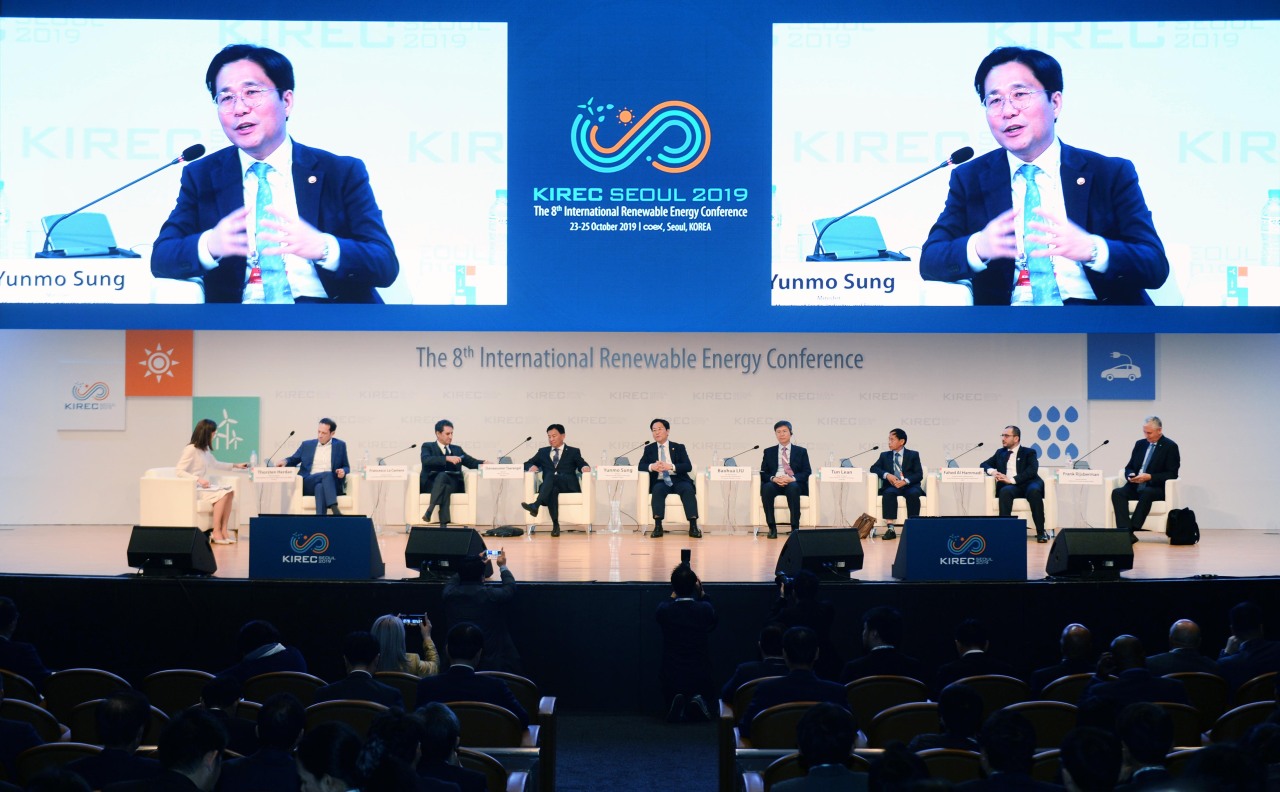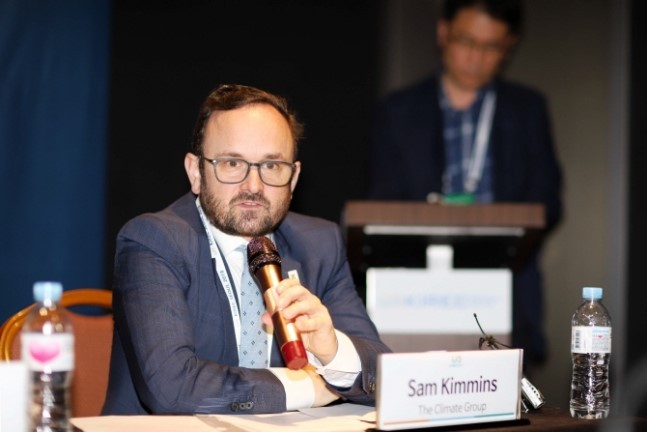South Korea is hosting an international renewable energy conference this week to discuss the global climate crisis and measures to expand renewable energy use with around 3,500 participants from 108 nations.
The International Renewable Energy Conference, which kicked off Wednesday in Seoul, is a biannual energy forum. The three-day event is being attended by government officials from 59 countries, including the US, Germany and China, international organizations, including the International Renewable Energy Agency, and firms such as Danish wind firm Vestas and Korean solar company Hanwha Q Cells.
The International Renewable Energy Conference, which kicked off Wednesday in Seoul, is a biannual energy forum. The three-day event is being attended by government officials from 59 countries, including the US, Germany and China, international organizations, including the International Renewable Energy Agency, and firms such as Danish wind firm Vestas and Korean solar company Hanwha Q Cells.

“Renewable energy-focused energy transformation is an innovative trend worldwide,” said Industry Minister Sung Yun-mo in his opening speech, citing the technological and market innovations in renewable energy.
The “technological paradigm of renewable energy” -- such as information and communications technology-based smart grid, energy storage, and fusion of renewable energy and hydrogen -- is shifting the energy paradigm from limited resources to sustainable resources, he said.
“Market innovation” is breaking down the boundaries between suppliers and consumers, shifting the market from being supplier-centered to companies and consumers-centered. Lastly, innovation is important as the involvement of local communities and residents is critical in the diffusion of renewable energy, he observed.
Arthouros Zervos, chairman of REN21, an international organization for renewable energy policy, said in his congratulatory address that “it is indisputable that a global energy system needs to be transformed.”
“The Asia-Pacific region, where more than 50 percent of the world’s population lives, consumes 39 percent of energy and accounts for 45 percent of greenhouse gas emissions. This means it has great potential for renewable energy and energy efficiency,” he said.
Former Secretary-General of the United Nations Chairman Ban Ki-moon gave a keynote speech on the theme of the necessity of reducing fine dust pollution and the role of renewable energy-centered energy conversion in response to climate change.
“Mankind has artificially created a climate crisis in the course of civilization and economic growth. The transition to clean and sustainable energy is no longer a choice but a necessity in the face of threats to the environment and ecosystems,” he said.
Ban said the UN’s Sustainable Development Goals and the Paris Convention will be determined by the success of energy transition, and renewable energy such as solar and wind power will be more advantageous in terms of marketability and socio-health than existing energy such as fossil fuels and nuclear power.
A panel discussion among high-level representatives was attended by government officials from Korea, China, the United Arab Emirates, Mongolia, Cambodia, Germany, and international organizations, including the International Renewable Energy Organization, the Global Green Growth Organization and the Asian Development Bank. Global Enterprises, such as Danish wind firm Vestas and Korean solar company Hanwha Q Cells, attended.
Two rounds of discussions were conducted on the topic of “vision for renewable energy and energy conversion” and “promoting socio-economic development through renewable energy and energy access.”
As the first speaker in the debate, Minister Sung Yoon-mo spoke about the direction of Korea’s energy conversion and the need for international cooperation.
‘Korea has achieved rapid industrialization and economic growth based on fossil fuels and nuclear energy, but it is pushing for the transition to clean and sustainable energy due to the increased climate crisis and energy risks,” he said.
“The goal of Korea to increase its share of renewable energy to 20 percent by 2030 demonstrates Korea’s commitment to energy conversion,” said Morten Dyrholm, senior vice president of Vestas.
“To achieve this, we need to work with local governments to improve the legal and institutional systems for renewable energy.”
“Renewable energy will account for 50 percent of global generation in 2050,” noted Xizhou Zhou, executive director of market research institute IHS Markit.

Energy experts urged the South Korean government and companies to do more in pushing for renewable energy during a press briefing separately held on the day.
Sam Kimmins, head of RE100, said, “25 Japanese companies joined RE100. It is extremely difficult to buy renewable energy in Japan as it is in Korea. The reason why those companies joined is that they see the future.”
RE100 is a global initiative that brings together global companies committed to 100 percent renewable power. No Korean companies have joined the move due mainly to the nation’s energy system that makes it difficult to purchase renewable energy only.
“Japan and Korea are high-tech economies in the 21st century. They will want to operate (their business) with 21st-century fuel (not fossil fuels) in the future because they are low-cost and fit for international trade,” Kimmins said.
They also highlighted the government’s role in increasing renewable energy in terms of subsidies and regulations.
“Initially, subsidies play a very important role in developing new capabilities and building a strong infrastructure for the supply side. Then, that is when the market takes over, competition plays and costs are down,” he said.
Vestas executive Dyrholm said, “The major challenge in Korea is a lack of (renewable energy) projects and it has a lot to do with regulations. There are many permit processes we need to go through.”
“In Denmark, to speed up projects, we made a one-stop approval process where interested developers of wind projects can go to one authority to go through all necessary steps. Such a system will enable Korea to do many more (renewable energy) projects,” he said.
By Shin Ji-hye (shinjh@heraldcorp.com)



![[Herald Interview] 'Amid aging population, Korea to invite more young professionals from overseas'](http://res.heraldm.com/phpwas/restmb_idxmake.php?idx=644&simg=/content/image/2024/04/24/20240424050844_0.jpg&u=20240424200058)














![[KH Explains] Korean shipbuilding stocks rally: Real growth or bubble?](http://res.heraldm.com/phpwas/restmb_idxmake.php?idx=652&simg=/content/image/2024/04/25/20240425050656_0.jpg&u=)

